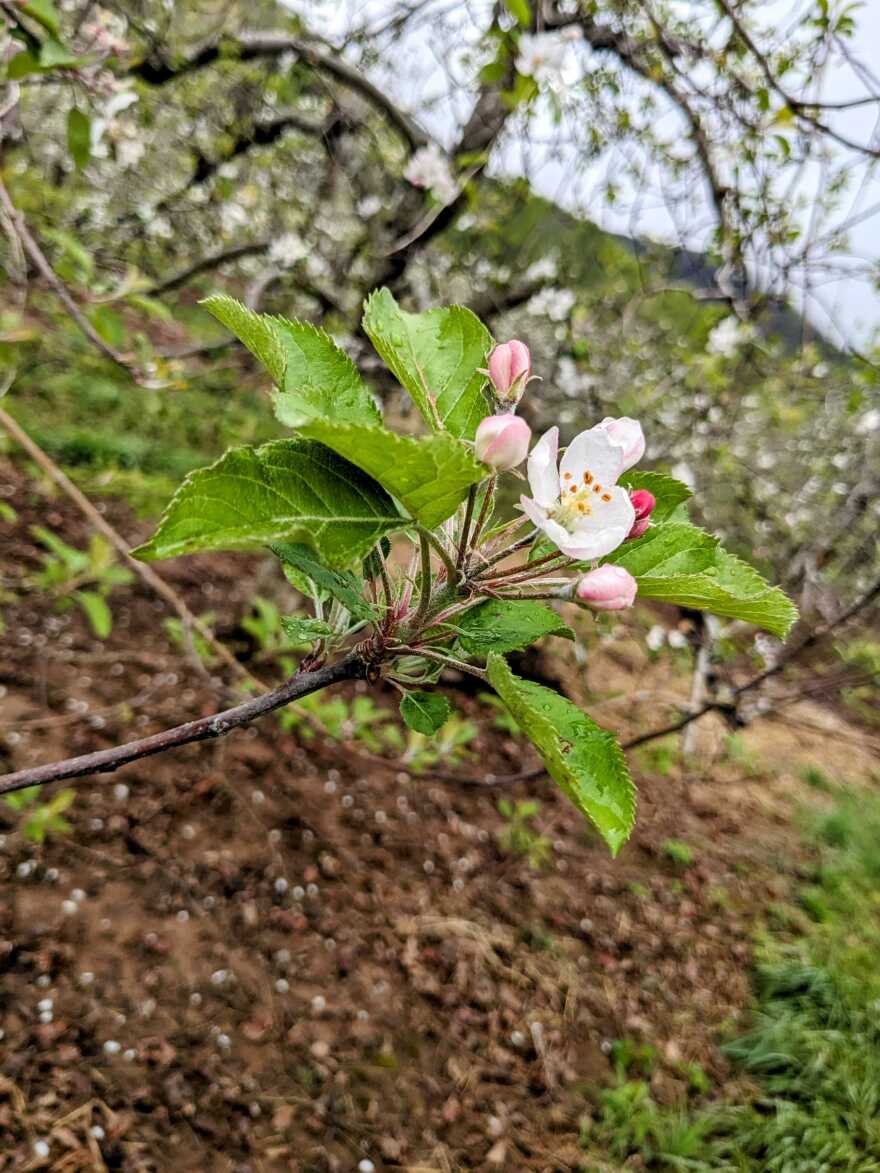Alan Deal is a third-generation apple grower in Alexander County, in the foothills near Boone. He walks through rows of the last apple trees still in bloom on his hundred-acre orchard and plucks a blossom from a branch to check for damage from a recent frost.
"Just a couple of degrees can make a lot of difference when the trees are blooming," Deal said, as he inspected the blossom. "But yep, that's one small apple that's starting to develop."

Deal's grandparents first planted the orchard in 1939, in what is the second-largest apple growing region in the state. Fruit trees grow on the hillsides sloping up either side of N.C. Highway 16, in what's known as the Brushy Mountains. The elevation protects the apple blossoms from spring frosts.
Luckily, Deal's fruit survived the frost this year, and he's hoping for a good crop come fall. But now he has a new worry: whether he'll have as many buyers as usual.
Earlier this year, the Trump administration eliminated funding for a U.S. Department of Agriculture (USDA) program that helps schools buy produce from local farms like Deal Orchards. Another program that was cut did the same for regional food banks.
Deal said he doesn't yet know the full impact that policy change will have on his farm — but he does know schools make up about 20% of his wholesale market.
Link: See how much your local NC public schools received for local food this year.
"School systems just simply won't have the funds to purchase at the levels that they used to, and that's sad for me," Deal said. "I consider our competition to be junk food and potato chips."
For about twenty years, Deal's apples have gone into North Carolina school lunches through the Local Food for Schools Cooperative Agreement Program. Deal said it's been good for children, good for the state's economy, and good for his business.
"We have other outlets for the larger fruit, but generally speaking, the smaller fruit is a good fit for the school systems and for young children," Deal explained.
Those smaller apples fit in a child's palm. Grocery stores might be less interested in them, but by selling to schools, Deal has a buyer for every size of apple that grows on his trees.
"We need to sell every, every box that we pick in order to make it, and the school systems, the food hubs, they're a large part of that," Deal explained.
Food hubs connect local farms to consumers
About 140 miles away in Durham, apples from Deal Orchards fill a walk-in refrigerator at Farmer Foodshare, a nonprofit food hub that transports North Carolina produce to schools, food banks, and small markets.
On a recent afternoon, Farmer Foodshare's Development Director Hillary Bruce opened a large refrigerator door to the apple storage.
"It smells amazing!" Bruce exclaimed. "It's definitely a perk of working here, how good this cooler in particular smells."
Bruce explained that the storage rooms full of apples, bell peppers, and tomatoes are more fragrant than the produce section of a grocery store because they're so fresh.
Farmer Foodshare's trucks drive out to farms regularly to bring produce into cold storage in Durham before it gets distributed throughout central North Carolina.
"We are sending refrigerated vehicles out to small farmers who wouldn't be able to afford to do that otherwise," Bruce said. "Oftentimes the produce that customers are receiving was in the field just a couple of days ago."
One of Farmer Foodshare's big customers has been local public schools. Bruce said she hopes the program changes how kids feel about fruits and vegetables.
"As a kid, I thought I hated tomatoes, but it turned out I just hated tomatoes that were not in season and just tasted kind of mealy and watery," Bruce said. "Once I started eating tomatoes that were in season and often grown locally, I was like, 'Oh my gosh, I actually love these!'"
Bruce said Farmer Foodshare's staff were shocked when the USDA announced the program would be cut entirely, because the funds were originally set to grow next year. They had hoped to expand service to more school districts.
"To have the federal funding end right now was really unfortunate," Bruce said.
Most NC school districts relied on federal funding to buy local produce
In recent years, Farmer Foodshare has distributed produce to Alamance-Burlington Schools, Durham Public Schools, and Orange County Schools. Durham Public Schools uses a mix of federal and local funds for the program, but the other districts rely primarily on the USDA grants to buy local produce.
This year, the North Carolina Department of Agriculture distributed nearly $5.5 million in federal funding to 100 school districts and seven charter schools to buy from local food hubs.

Alamance-Burlington Schools' Child Nutrition Director Spencer Brown said the district received $93,000 this year, and was anticipating about twice as much federal funding next year.
The exact funding varies district by district, but in any case it will be hard for districts across the state to make up the lost funds if they want to keep buying local meat and produce.
"When sweet potatoes were in, we had sweet potatoes. When broccoli was coming up, we had broccoli. Strawberries were a special treat," Brown said.
Alamance-Burlington Schools also purchased some of Deal's apples this school year.
Brown said he'll pursue other grant funding, but like many other school systems, the district is facing many budget pressures right now.
Brown said Alamance-Burlington Schools will keep purchasing foods locally when it proves more cost-effective - in some cases it is, and other times it's not.
On a recent afternoon, as students moved through the lunch line at Eastlawn Elementary in Burlington, the apples on the menu were grown at an orchard in Hendersonville, North Carolina. But with federal funds ending this fall, they probably won't have local produce as often next year.












